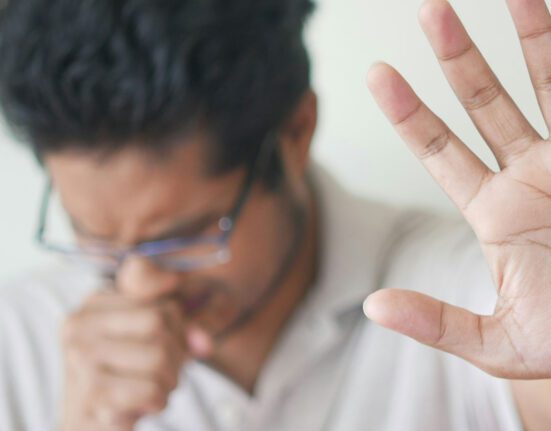Anxiety. What is it?

What is it? Long COVID refers to persistent symptoms that continue after the acute phase of COVID-19, and anxiety can be a significant psychological manifestation during this phase.
Typical Symptoms:
- Excessive worry or fear about health, future, or daily activities
- Difficulty concentrating or making decisions
- Physical symptoms like rapid heartbeat, sweating, or trembling
- Sleep disturbances, including difficulty falling asleep or staying asleep
- Feelings of restlessness or being on edge
Who Gets It?
Anyone experiencing long COVID, regardless of the severity of the initial infection, may develop anxiety. Factors such as pre-existing mental health conditions, isolation, and the uncertainty of long-term symptoms can contribute to anxiety levels.
Key Points:
- Long COVID can lead to heightened anxiety levels due to ongoing health concerns and uncertainties.
- Anxiety symptoms can impact daily functioning, including work, relationships, and overall well-being.
- Treatment for anxiety in long COVID may involve therapy, medication, relaxation techniques, and lifestyle adjustments.
- Support from healthcare professionals, family, and friends is crucial in managing anxiety symptoms effectively.
- Building resilience through self-care practices and positive coping strategies can help individuals navigate anxiety during their recovery from long COVID.
Relief:
- Therapy: Cognitive-behavioral therapy (CBT) and other forms of talk therapy can be highly effective in managing anxiety. A therapist can help you identify and challenge negative thought patterns, develop coping strategies, and work through any underlying issues contributing to your anxiety.
- Medication: In some cases, medication such as selective serotonin reuptake inhibitors (SSRIs) may be prescribed to alleviate anxiety symptoms. It’s important to work closely with a healthcare provider to determine the most appropriate medication and dosage for your needs.
- Relaxation Techniques: Practice relaxation techniques like deep breathing exercises, progressive muscle relaxation, yoga, or meditation. These techniques can help calm your mind and body, reducing anxiety levels.
- Physical Activity: Exercise releases endorphins which can lift your mood and ease your anxiety but this needs to proceed with care, particularly for sufferers with fatigue or post exertional malaise (PEM). Gentle exercise such as yoga, pilates are good for some. Long Haulers need to work with the health care professionals managing their treatment to assess the exercise or body movement suitable for them. Inappropriate exercise for those suffering from PEM is harmful. If you don’t have access to a healthcare professional, then learning how to manage your energy levels with pacing techniques from approved websites such as ours or Long COVID Physio are also useful.
- Healthy Lifestyle: Maintain a balanced diet, get adequate sleep, and limit caffeine and alcohol intake. A healthy lifestyle can support overall well-being and resilience against anxiety.
- Mindfulness Practices: Incorporate mindfulness practices into your daily routine, such as mindfulness meditation or mindful eating. Mindfulness helps you stay present in the moment, reducing anxiety about the past or future.
- Social Support: Stay connected with supportive friends, family members, or support groups. Sharing your experiences and feelings with others who understand can provide comfort and reduce feelings of isolation.
- Limit Stressors: Identify and minimize sources of stress in your life. This may involve setting boundaries, delegating tasks, or seeking support for challenging situations.
Remember, managing anxiety is a journey, and it’s essential to find a combination of strategies that work best for you. Consult with a healthcare professional for personalized guidance and support tailored to your specific needs.
Credible sources of information:
The following references are a guide. Please refer to a fully qualified and fully registered healthcare practitioner such as a Psychologist, Family Physician or Psychiatrist for diagnosis and management of your illness.
I have not discovered a website or literature that specifically addresses Long COVID-associated mental illness, and the approach appears to be to treat mental illness in the Long Hauler as you would someone without Long COVID, as poor mental health has been shown to postpone recovery. Some of the links provided below are not Long COVID-specific, but they may be beneficial.
1. Long COVID the Answers interview with Thida Thant – “The Psychiatric Management of Mental Health in Long COVID – coming soon.
2. Anxiety Canada – a not for profit organization that gives helpful information on anxiety management. This is not Long COVID specific but none the less useful. There are free resources and an app to access, examples include free CBT courses for adults, young adults and children. Worth a visit.
3. Clearing the Fog: From Surviving to Thriving with Long COVID – A Practical Guide – by James C. Jackson – Great practical guide on managing mental illness with Long COVID
4. “A Guide to Long COVID & Mental Health” – Excellent guide published by University College London and the University of York. Mainly aimed at UK citizens but still generally useful none the less. Some good management techniques for managing anxiety in Long COVID.
5. The Canadian Mental Health Association – a Canadian, nationwide association with 330 community locations offering low cost counselling, access to an assisted care team for emergency outreach, social and peer support and much more. Each location has details of what mental health support is available in their local area.
6. HelpGuide.org – is a not for profit, international organisation spanning 9 countries that has resources for a variety of mental health issues and a directory of national mental health helplines in each of the 9 countries it features.
7. World Health Organisation – if you type “Long COVID and mental health” in the website search engine pages of information and research about the Worldwide effects of the pandemic on our mental health Long COVID and mental health appear. This ranges from research done in specific countries to presentations of various mental health topics about COVID-19 and Long COVID. Worth exploring.








